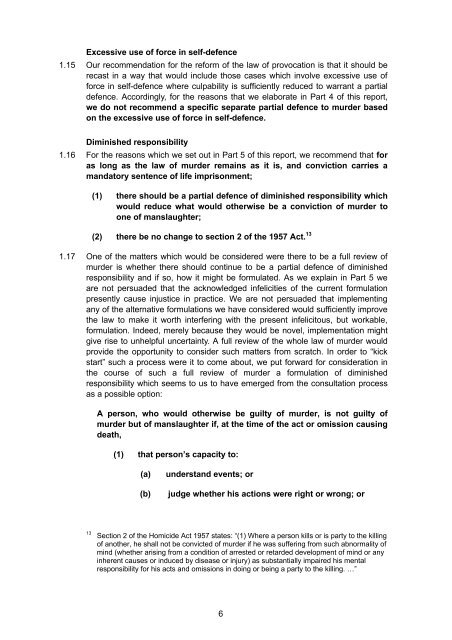lc290 Partial Defences to Murder report - Law Commission
lc290 Partial Defences to Murder report - Law Commission
lc290 Partial Defences to Murder report - Law Commission
Create successful ePaper yourself
Turn your PDF publications into a flip-book with our unique Google optimized e-Paper software.
Excessive use of force in self-defence<br />
1.15 Our recommendation for the reform of the law of provocation is that it should be<br />
recast in a way that would include those cases which involve excessive use of<br />
force in self-defence where culpability is sufficiently reduced <strong>to</strong> warrant a partial<br />
defence. Accordingly, for the reasons that we elaborate in Part 4 of this <strong>report</strong>,<br />
we do not recommend a specific separate partial defence <strong>to</strong> murder based<br />
on the excessive use of force in self-defence.<br />
Diminished responsibility<br />
1.16 For the reasons which we set out in Part 5 of this <strong>report</strong>, we recommend that for<br />
as long as the law of murder remains as it is, and conviction carries a<br />
manda<strong>to</strong>ry sentence of life imprisonment;<br />
(1) there should be a partial defence of diminished responsibility which<br />
would reduce what would otherwise be a conviction of murder <strong>to</strong><br />
one of manslaughter;<br />
(2) there be no change <strong>to</strong> section 2 of the 1957 Act. 13<br />
1.17 One of the matters which would be considered were there <strong>to</strong> be a full review of<br />
murder is whether there should continue <strong>to</strong> be a partial defence of diminished<br />
responsibility and if so, how it might be formulated. As we explain in Part 5 we<br />
are not persuaded that the acknowledged infelicities of the current formulation<br />
presently cause injustice in practice. We are not persuaded that implementing<br />
any of the alternative formulations we have considered would sufficiently improve<br />
the law <strong>to</strong> make it worth interfering with the present infelici<strong>to</strong>us, but workable,<br />
formulation. Indeed, merely because they would be novel, implementation might<br />
give rise <strong>to</strong> unhelpful uncertainty. A full review of the whole law of murder would<br />
provide the opportunity <strong>to</strong> consider such matters from scratch. In order <strong>to</strong> “kick<br />
start” such a process were it <strong>to</strong> come about, we put forward for consideration in<br />
the course of such a full review of murder a formulation of diminished<br />
responsibility which seems <strong>to</strong> us <strong>to</strong> have emerged from the consultation process<br />
as a possible option:<br />
A person, who would otherwise be guilty of murder, is not guilty of<br />
murder but of manslaughter if, at the time of the act or omission causing<br />
death,<br />
(1) that person’s capacity <strong>to</strong>:<br />
(a) understand events; or<br />
(b) judge whether his actions were right or wrong; or<br />
13 Section 2 of the Homicide Act 1957 states: “(1) Where a person kills or is party <strong>to</strong> the killing<br />
of another, he shall not be convicted of murder if he was suffering from such abnormality of<br />
mind (whether arising from a condition of arrested or retarded development of mind or any<br />
inherent causes or induced by disease or injury) as substantially impaired his mental<br />
responsibility for his acts and omissions in doing or being a party <strong>to</strong> the killing. …”<br />
6

















